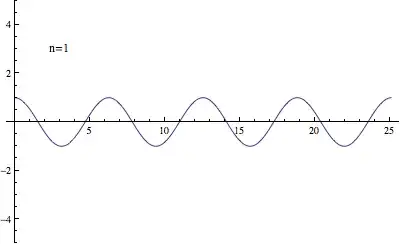Sum of Dirac Deltas
As a distribution,
$$
\lim_{n\to\infty}\sqrt{n}\cos^{2n-1}(x)=\sqrt\pi\sum_{k\in\mathbb{Z}}(-1)^k\,\delta(x-k\pi)\tag{1}
$$
where $\delta(x)$ is the Dirac-delta distribution.
Limit $(1)$ follows because $\cos(x)$ is $2\pi$-periodic and on any compact $K\subset[-\pi/2,3\pi/2]\setminus\{0,\pi\}$, the sequence of functions $\sqrt{n}\cos^{2n-1}(x)$ tends to $0$ monotonically for $n\ge\frac12\sup\limits_{x\in K}\cot^2(x)$. Yet, on $[-\pi/2,\pi/2]$, $\sqrt{n}\cos^{2n-1}(x)\ge0$ and using the substitution $x\mapsto x/\sqrt{n}$
$$
\begin{align}
\lim_{n\to\infty}\sqrt{n}\int_{-\pi/2}^{\pi/2}\cos^{2n-1}(x)\,\mathrm{d}x
&=\lim_{n\to\infty}\int_{-\sqrt{n}\pi/2}^{\sqrt{n}\pi/2}\cos^{2n-1}(x/\sqrt{n})\,\mathrm{d}x\\
&=\lim_{n\to\infty}\int_{-\sqrt{n}\pi/2}^{\sqrt{n}\pi/2}\left(1-\frac{x^2}{2n}+O\left(\frac{x^4}{n^2}\right)\right)^{2n-1}\,\mathrm{d}x\\
&=\int_{-\infty}^\infty e^{-x^2}\,\mathrm{d}x\\[9pt]
&=\sqrt\pi\tag{2}
\end{align}
$$
Since $\cos(x+\pi)=-\cos(x)$, we get that on $[\pi/2,3\pi/2]$, $\sqrt{n}\cos^{2n-1}(x)\le0$ and
$$
\lim_{n\to\infty}\sqrt{n}\int_{\pi/2}^{3\pi/2}\cos^{2n-1}(x)\,\mathrm{d}x=-\sqrt\pi\tag{3}
$$
$\hspace{3.5cm}$
The Integral Near $\boldsymbol{0}$
Since $\sqrt{n}\cos^{2n-1}(x)$ is an even function, we have that half of its mass at $0$ is to the left and half is to the right; that is,
$$
\lim_{n\to\infty}\sqrt{n}\int_0^{\pi/2}\cos^{2n-1}(x)\,f(x)\,\mathrm{d}x=\frac{\sqrt\pi}2f(0)\tag{4}
$$
If we wish to be a bit more rigorous, we could repeat the integral in $(2)$ on $[0,\pi/2]$.
The Whole Integral
Applying $(1)$ while taking $(4)$ into account, we get
$$
\begin{align}
\lim_{n\to\infty}\sqrt{n}\int_0^\infty\cos^{2n-1}(x)\,e^{-ax}\,\mathrm{d}x
&=\sqrt\pi\left(\frac12+\sum_{k=1}^\infty(-1)^ke^{-ak\pi}\right)\\
&=\sqrt\pi\left(\frac1{1+e^{-a\pi}}-\frac12\right)\\
&=\frac{\sqrt\pi}2\tanh(a\pi/2)\tag{5}
\end{align}
$$
An Interesting Variant
Using the same ideas, we get that
$$
\begin{align}
\lim_{n\to\infty}\sqrt{n}\int_0^\infty\cos^{2n}(x)\,e^{-ax}\,\mathrm{d}x
&=\sqrt\pi\left(\frac12+\sum_{k=1}^\infty e^{-ak\pi}\right)\\
&=\sqrt\pi\left(\frac1{1-e^{-a\pi}}-\frac12\right)\\
&=\frac{\sqrt\pi}2\coth(a\pi/2)\tag{6}
\end{align}
$$
